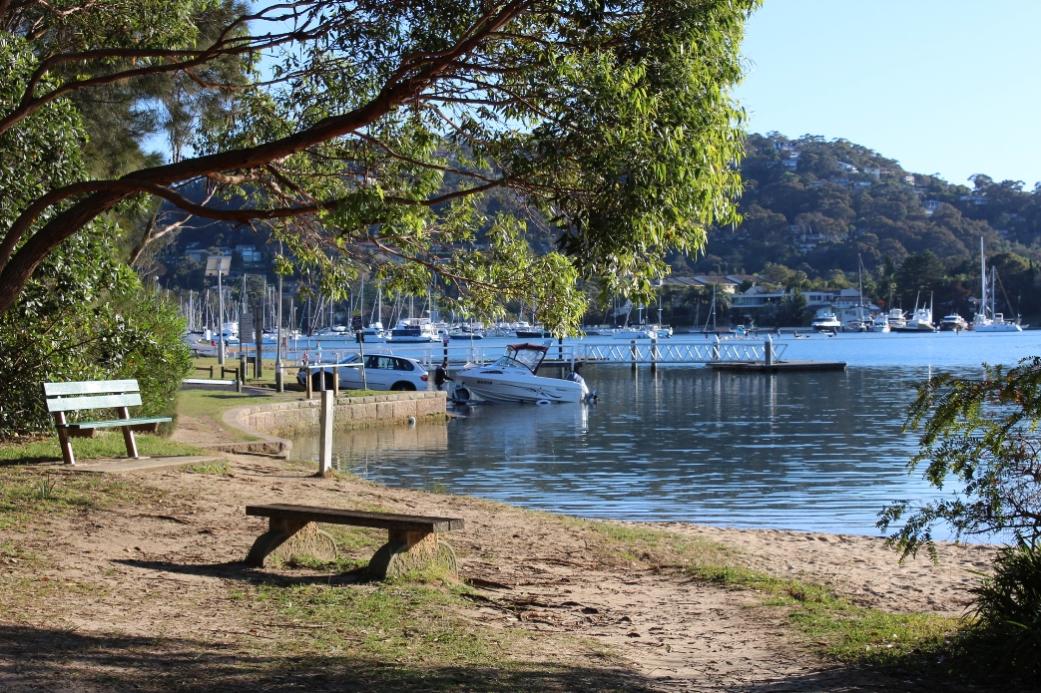August 13 - 19, 2017: Issue 325
John McInerney OAM
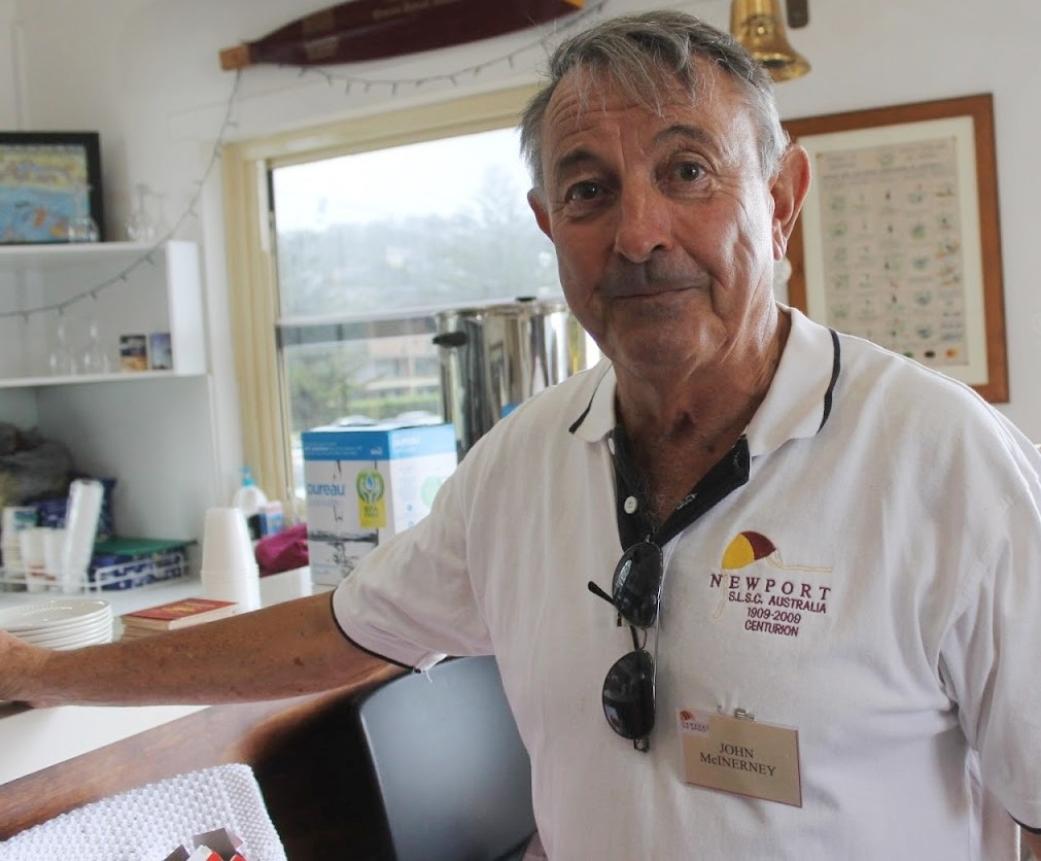
Vietnam Veterans Day (Northern) takes place today, Sunday August 13th, with a March from Palm Beach Ferry Wharf to the Cenotaph at Palm Beach RSL (Club Palm Beach) at 11.00 a.m.
Vietnam Veterans Day is commemorated on 18 August every year. The day was originally known as Long Tan Day, chosen to commemorate the men of D Company, 6RAR who fought in the battle of Long Tan in 1966. On that day, 108 Australian and New Zealand soldiers fought a pitched battle against over 2,000 North Vietnamese and Viet Cong troops in a rubber plantation not far from the small village of Long Tan.
Each year a small insight into one of our community members who served in this conflict reminds us of the rich life many around us have led in their determination to 'get on with it' after they have served in our defence forces. Vietnam was the last conflict Australians could be conscripted into prior to the age when they were able to vote - the age for voting being lowered from 21 to 18 in 1974. Prior to this men aged 20 had to perform National Service and could be sent overseas.
This year a small insight into a gentleman who began his adult life serving, and serves the community still - at Newport SLSC, where he has worked in a variety of roles, and as the gentleman who helped launch the Veterans Centre – Sydney Northern Beaches.
Where were you born?
I was born in Albury, New South Wales, down on the border, so I’m a country boy.
Did you grow up there?
Yes, until I was conscripted in 1966 as part of the 4th intake for the Vietnam War. I went into Ordnance and was posted to the Headquarters Group in Vietnam.
How long were you there?
Around 11 months, going over in late 1966 and returning in 1967. I moved around a bit; sending time in Nui Dat, a lot of time in Vung Tau and also spent some time in Saigon and even up in Bien Hoa, I had a role up there with the Americans.
What were your duties?
I did an Ammo Tech’s course, which is related to ammunition, so worked in that.
What was the most horrific experience for you?
I suppose everybody did Patrols and duties like that, but I remember one night doing a Clearing Patrol outside the wire and the USS Missouri let off a hue salvo out off the bay. It went from being pitch black to all of a sudden, with this incredibly BANG, the sky was like day. The earth shook and I thought somebody had dropped an atomic bomb.
I didn’t quite discover that adrenalin is brown in colour, but…
Then about fifteen minutes later they let go another one, but even then we had no idea what it was. They were firing over the top of us, shooting up into the hinterland.
The other horrific experience would be seeing people dead in Saigon. The place had been turned into a sh*thole.
Were there any memorable experiences that weren’t bad?
There were a lot of funny times – I think that movie with Graham Kennedy and Bryan Brown, The Odd Angry Shot, probably typifies what a lot of us experienced on the opposite side of the coin.
What was it like coming home, were you a different person from the John that left?
Yes, people think I was. I went early and came home early from the unit. I had a day in Sydney, where the police made sure we didn’t get into trouble – we arrived early in the city and then had a day waiting around to catch the train home to Albury.
I came home to a very supportive family and environment though. My dad had fought in World War II. All he wanted to do on the Sunday morning I got home was cart me up to the SS&A, the Sailors, Soldiers and Airmen's Club in Albury and buy me a beer. I was over 21 then, just.
Where did your dad serve?
In New Guinea.
(In 2012, as a Vice-President of Avalon Beach RSL Sub-Branch, John gave the VP Day - Victory in the Pacific - Commemorative Address at the annual Service held at the Avalon Beach RSL Cenotaph)
What did you do after you got out?
I drifted a bit, I was a trainee accountant prior to being conscripted and I suppose conscription offered me an escape of sorts from that, which is rather ironic as I went back and studied accountancy much later.
I thought, when home, that I really didn’t want to go back into that; I was an administration trainee in the New South Wales hospital system prior to going in. So I drifted, doing bits and pieces.
Then Mobil Oil picked me up as a trainee and they really spent a lot of money on training people which I consider in many ways was the making of me; they turned me into a good corporate citizen, if there is such a thing, training me to use my analytical skills and how to be a businessman, amongst many other skills. I went back to the RMIT and did Transport Economics as part of this.
They sent me to Mildura, which is about as far away as you can get from Head Office, a beautiful spot. I also had time in Ballarat as well as a number of stints in the Head Office in Melbourne between postings.
They were a great company that in those days used to train people from scratch.
I was with them for around 10 years.
I then left them to become a Mobile Distributor, and that was in the Riverina. We then sold that business when I was still down at Jerilderie in the southern Riverina. I thought, well, there’s nothing here for me now – my marriage had come to a halt, we’d sold the business.
I then ended up heading north and got a job in Newcastle in the IT industry, by accident I think. The only reason I got the job I think was the old guy doing the hiring was a WWII Veteran. I didn’t have any experience so I think the attitude was ‘he’s one of us, I’ll take him’. He was a great mentor over the years, old Norm Cann – he’s passed away now sadly.
At any rate, that got me into the computer industry, working for Northern Computer Services, they had about 100 staff in Newcastle. I can remember data punch card trays, which you dropped at your peril – I remember writing programs this way for years. These were ‘new things’. The beauty of it was if you got the program wrong you put the punched card in and it shot the errors out.
I did a number of things for them, moving into Sales and about five years later I became the General Manager.
I left them to join Fujitsu and that’s when I first came to Sydney to live.
Originally I was staying in Greenwich. I employed a South African, Rhodesian guy who lived down here in Pittwater, at the end of Coles Parade in Newport. I came down to visit and thought, ‘this isn’t a bad spot’ and moved to Newport about 12 months after being in Sydney and have been here ever since.
I met my second wife here too.
Newport Surf Life Saving Club, you’re a Life Member there, when did you join?
Not long after moving here. I joined as a Social Member and then was the Vice President for a period. I redid my Bronze with a group – Doug Menzies and Rob Emerson are all out of my old Patrol – the Club Captain at that stage, Ronnie Bridges, said ‘I can’t put a 22 year old in charge of these old blokes’ – so that was the start of a number of really great friendships.
I became President in 2000 and served in that capacity for a few years.
What was your presidency at that great old club like?
We were in strife when I came in, we were down to not enough patrolling members, financially we were in ‘straitened circumstances’. People like Ian Storey, Doug Menzies and Gary Cook and others and I worked to rebuild the club. We did a number of things to bring people back in, made it a business.
I suppose the highlight of my time there was we introduced our disabled squads which I think is a great initiative. If I’m proud of anything I was associated with then, it would be that, and how the Menzies & Budd families succeeded in getting that of the ground.
Newport is the sort of club that has always been able to work out the concept and that has the people who will put in the work to make it happen.
What, for you, is the best part of being a member of a surf club?
I think, these days, it’s the friendship and camaraderie. It certainly is a great reason to keep up a reasonable degree of fitness when you’re a patrolling member.
I also served on the Kelloggs Presidents Advisory Group, which introduced me to like people from all around Australia, and this too has made for enduring friendships.
Surf clubs are pretty friendly groups, that’s their nature.
You are current Chairman of the Sydney Northern Beaches Veterans Centre, a volunteer position – how many hours a week are you doing there?
It varies, but ten hours a week would be a conservative estimate. I’m there because of Graham Sloper. I had nothing to do with the RSL prior to him rounding me up at a cocktail party at Bronwyn Bishop’s place; he knew who I was, knew my background, I didn’t know him.
He said ‘you should join the RSL’ and I explained I wasn’t into that. I joined Legacy and was the Divisional Chairman for a period of time and Secretary for a number of years and I’m still a legatee.
At any rate, Graham started banging on about how I was a bit tardy at getting the forms in at times and we consequently became very good friends. He put me in to do a project study of our services and how they were meeting the needs of Veterans and their dependants and from that the idea of the Veterans centre was born.
I’m actually currently looking for a new Chairman, not because I’m not enjoying it, but because I think it’s time for fresh ideas.
I’m very proud of what we achieved. Both Graham and I would not have envisioned just how far we’ve come and the direction this service has now taken.
That fundraising function The Sydney Northern Beaches Veterans Centre Inaugural Resilience Luncheon April 2017 held for Veterans at Dee Why was wonderful – great to see so much support from all sectors of our community.
There is some news relating to that – the Governor of New South Wales, His Excellency General The Honourable David Hurley AC DSC (Ret'd), has agreed to give the Centre Vice Regal Patronage, which he agreed to that day when I asked him. Most of the younger Veterans would have either served with him or in battalions under him – he was their General in Afghanistan. He remains a beacon to many ex-servicemen and women and a very highly respected solider. He genuinely cares about those who have served, especially the new Veterans returning to our communities, and continues to do anything and all he can for them.
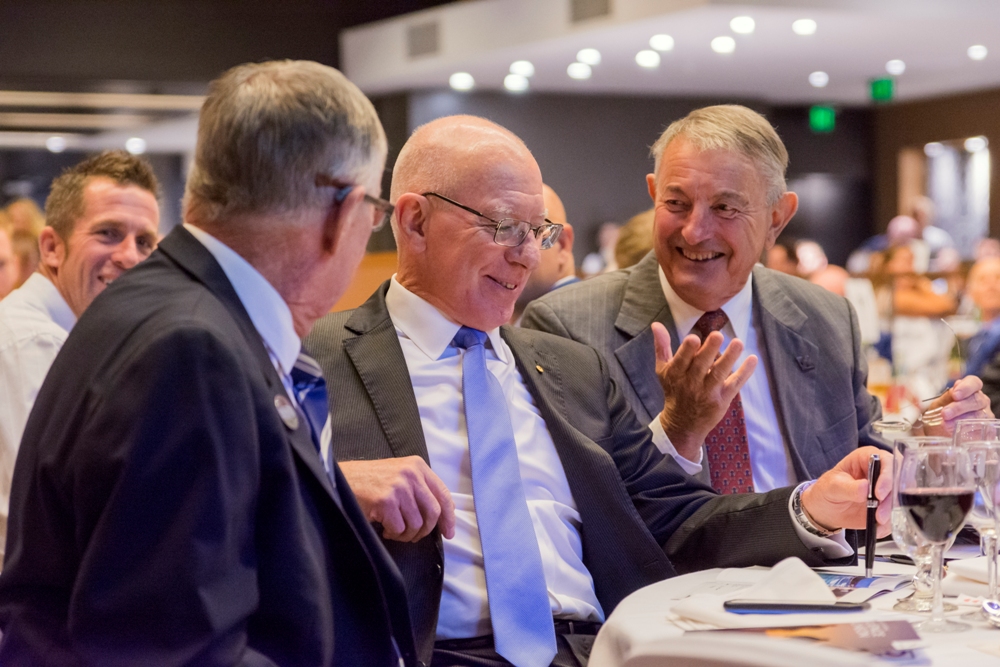
Governor of New South Wales, His Excellency General The Honourable David Hurley AC DSC (Ret'd) and John McInerney OAM
Ben Webb runs the Centre and the Board concentrates on governorship.
We also have ambassadors, Matt Stevens being one of these for the Army. Captain Michael Maley DSM RAN, who has taken on the duties of President of Avalon Beach RSL Sub Branch, is our ambassador for the Navy. We will also have an Air Force ambassador.
Visit: http://vcsnb.org.au/
Vietnam Veterans Day (Northern – August 13th this year, and August 18th for main March in town) What does Vietnam Veterans Day mean to you John?
I suppose it’s the one day of the year that I let my hair down and then claim something has bitten me when I get home. Maggie states that doesn’t really cut water; ‘I think you were a ratbag before you went.’
The march holds a remaining place of respect and something I want to do with soldiers who served in this conflict. Army march better than the other two services, so this is a proper march, you can see that.
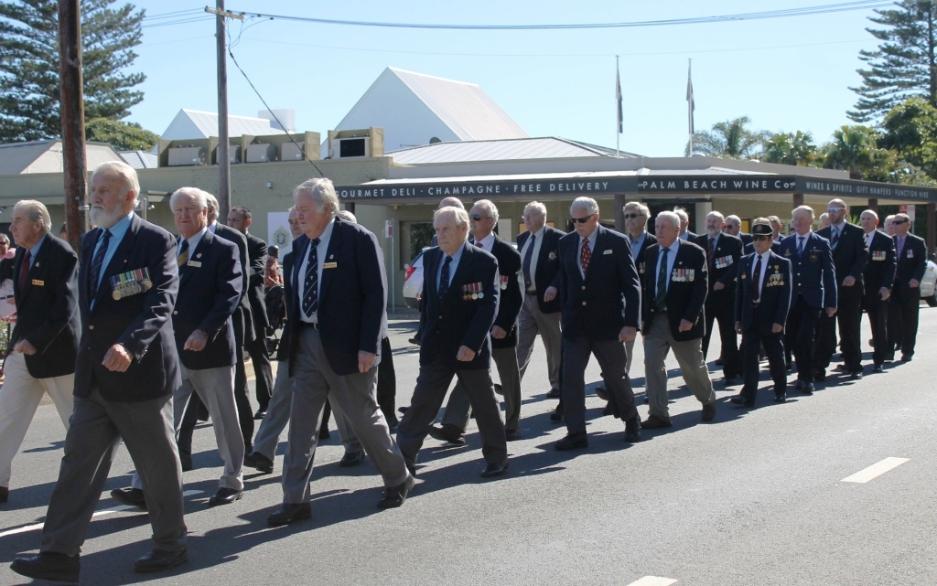
Vietnam Veterans (Northern) March at Palm Beach - 2013
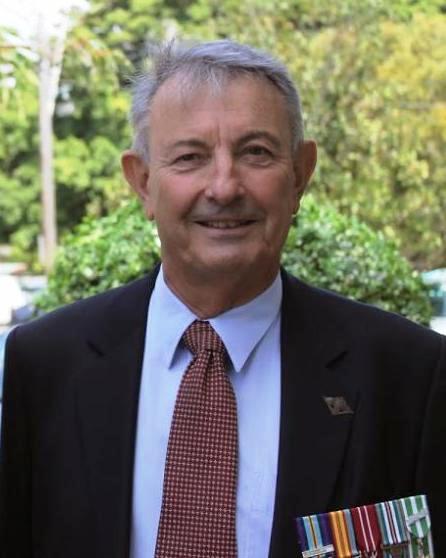 We’re all like-minded too, we have all shared the same experience, so to spend time with these friends remains a kind of release as much as something that helps those still affected by that conflict.
We’re all like-minded too, we have all shared the same experience, so to spend time with these friends remains a kind of release as much as something that helps those still affected by that conflict. We may indulge a little that day, although, as we get older, the indulgence lessens. In fact, the surf club first found out I was a Vietnam Veteran one day when four of us got off the L90 back from Palm Beach and had trouble getting across the road and decided we’d go and have a beer at the Surf Club until the traffic dispersed.
They were taking bets, apparently, as to whether we’d get across the car park!
Does it still provide you with a sense of comfort, meeting up with other Vietnam Veterans?
I was fortunate – I got over it pretty quickly. I think Matt Stevens had a good comment when he explained that this was two years out of our lives, which went by in a flash by the way, and that that should not define your whole life.
Yes, it’s good to get together and have a laugh, so for that reason alone, it’s a bloody good day.
How did you meet Maggie?
I met her down at the Newport Arms one afternoon. I said to the guy with me, ‘I’m going to marry this lass’ – he said ‘who is she?’ to which I answered, ‘I don’t know’.
(laughs)
We went over and engaged in conversation, and it went on from there. Maggie had been living in Newport for some time, I’d seen her around, but this day, I stepped forward.
It was around 7 months from finally meeting to marrying.
A lot of the things I’ve done, the Surf Club, the Veterans Centre, she has been wonderfully supportive, a lovely woman.
What are your favourite places in Pittwater and why?
I like Bayview, the little café and the park at the side. We’re now down to a golden retriever, singular. We sit there and have a coffee and just enjoy the view for an hour or so.
The estuary of Pittwater itself is very nice.
What is your ‘motto for life’’ or a favourite phrase you try to live by?
Well, I read Philosophy these days, and often quote to myself and other words of Optimism and Enthusiasm – they are the keywords for today to me.
My daughter says the family motto should be ‘Lead, Follow, Or Get out of the Way’.
Really, for me, it’s ‘Get on with it’ – there’s no rehearsals here.
Notes
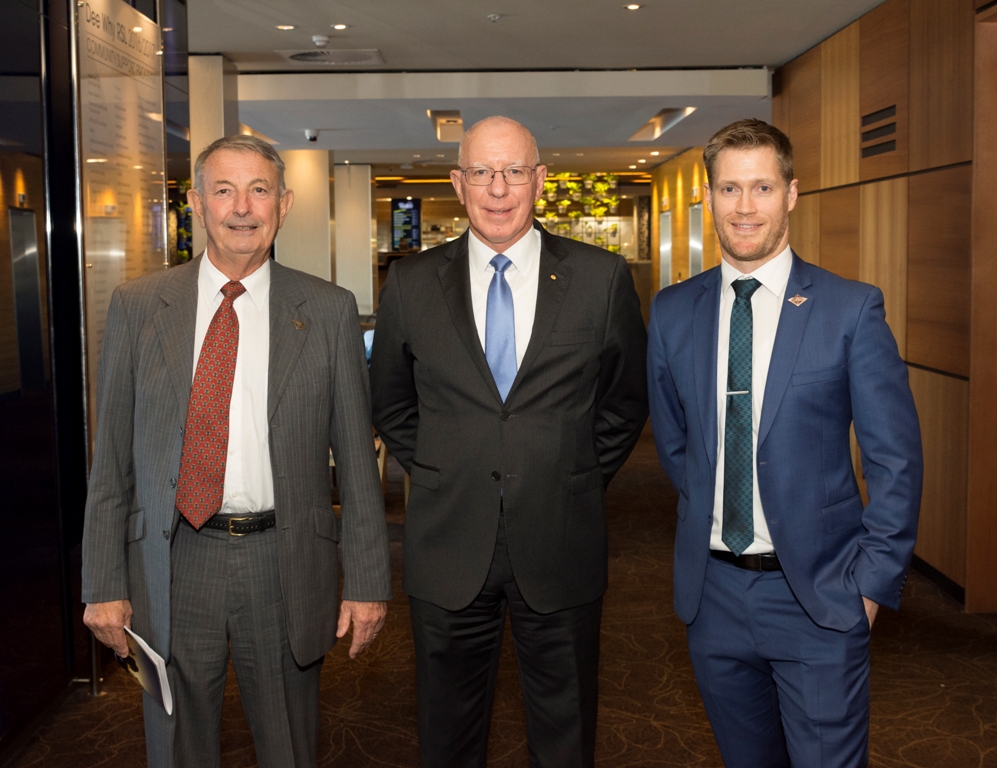
Mr Robert John McINERNEY, OAM
Newport
For service to veterans and their families, and to surf lifesaving.
Service includes:
Manager, Sydney Northern Beaches Veterans Centre, (Ex-Service Organisational Cooperative involving Department of Veterans Affairs, RSL Life Care, Legacy, and the Vietnam Veterans Association), 2012-2015 and Widows Claims Officer, since 2012.
Legatee, Northern Beaches Division, Legacy Australia, since 2007 and Chair, 2010 and Secretary, since 2012.
New South Wales Representative, National Pensions Committee, Legacy Australia, current.
Pensions Officer and Vice-President, Avalon Beach Sub-Branch, The Returned and Services League of Australia, since 2010.
President, Newport Surf Life Saving Club, 2000-2002 and Deputy President, 1995-2000 and Member, since 1992.
From Australian Government, Department of Veteran Affairs: Nominal Roll of Vietnam Veterans
Name: MCINERNEY, Robert John
Service No: we're leaving this blank readers
Service: Army
Date Of Birth: 17/12/1945
Rank: Corporal
Place Of Birth: Albury NSW AUSTRALIA
Corps: Royal Australian Army Ordnance Corps
National Service: Yes
Served in 2nd Composite Ordnance Depot - 231 days in Vietnam (post training): An initial ten weeks' recruit training was followed by three months of corps training.
This collection of photo sets are from soldiers who served with the Ordnance Depot in Vung Tau, South Vietnam from 1966 until 1972. The Unit had two names in that period. From April 1966 until 31st December 1967 it was named 2 Composite Ordnance Depot (2Comp Ord). From 1st January 1968 until its closure in March 1972 was named 2nd Advanced Ordnance Depot (2AOD).
Many of the photos in these sets will appear in other categories also.
The sets are in order of arrival in Vietnam and not in alphabetical order. That way it is easy to see how the unit grew over the years from the tents initially to buildings later. Of course a lot of the photos were not just taken at the unit's base which was situated on the Back Beach of Vung Tau on the South China Sea about 125 KMs south east of Saigon.
Anyone who recognises our Soldiers or our Vietnamese Employees that are not named please email me (Stan Middleton) on stanmid@bigpond.net.au so I can add their names. I served in our unit in 1967-68.
National Service, 1965–72
A scheme of selective National Service
On 5 November 1964, Cabinet decided to introduce a compulsory selective National Service scheme. In announcing this decision to Parliament, Prime Minister Robert Menzies referred to ‘aggressive Communism’ developments in Asia, such as ‘recent Indonesian policies and actions’ and a ‘deterioration in our strategic position’, as being influential in the decision being reached (see Parliamentary Debates, House of Representatives, 25th Parliament, 1st Session, pp. 2517–2724). The Government had concluded that Australia had inadequate Defence manpower and aimed to increase the strength of the Army to 33,000 by the end of 1966 by introducing national service.
The National Service Act 1964, passed on 24 November, required 20 year old males, if selected, to serve in the Army for a period of twenty four months of continuous service (reduced to eighteen months in 1971), followed by three years in the Reserve. The Defence Act was amended in May 1965 to provide that conscripts could be obliged to serve overseas, and in March 1966, Prime Minister Holt announced that National Servicemen would be sent to Vietnam to fight in units of the Australian Regular Army.
Between 1965 and December 1972 over 800,000 men registered for National Service. Some 63,000 were conscripted and over 19,000 served in Vietnam. Although registration was compulsory a process of selection by ballot determined who would be called up. Two ballots were conducted each year. The ballots selected several dates in the selected period and all males with corresponding birthdays were called up for national service. The ballot was conducted using a lottery barrel and marbles representing birthdays. The barrel and marbles are held in the National Office, Canberra, in series MP1357/63.
Opposition to conscription
From 1966 opposition to conscription swelled and was often enmeshed with opposition to Australia’s involvement in the Vietnam War. Evasion of national service was not uncommon. Some cases were prosecuted harshly leading to much publicity. National Service was a significant issue in the Federal election campaigns of 1966, 1969 and 1972. The Australian Labor Party consistently opposed it and was committed to recalling troops from Vietnam.
With the election of an ALP government in December 1972, Prime Minister Whitlam announced the end of peace time conscription as one of his government’s first administrative decisions. Those National Servicemen who did not wish to complete their term of service were discharged immediately. The National Service Act was amended in 1973 to abolish the obligation to undertake National Service.
From and by National Archives of Australia – Fact sheet 164
Inaugural Resilience Luncheon
On behalf of the Veterans Centre – Sydney Northern Beaches Board of Directors, thank you for supporting the Inaugural Resilience Luncheon on the 7th of April 2017.
It was a memorable afternoon of entertainment, insight, great food, drink and company. We hope you thoroughly enjoyed the experience.
We were completely overwhelmed by the response from everyone attending.
With your generous donations we were able to raise over $118,000!! This amount exceeded our goal and will assist us in helping our Veteran community even further.
These funds will enable us to address client shortfalls in our region by employing a specialist.
This will:
- Reduce client wait times.
- Enable greater capacity to work preventatively with ADF, reduce numbers in crisis.
- Use of a Deductable Gift Fund for Necessitous needs. Accessible, via an application, to any community or ex-service organisation who have an eligible current or former Serviceman, women or family member in need.
I look forward to reporting on the positive impact these funds have made to our communities.
Warmest regards
Ben Webb
Centre Manager

John McInerney OAM, the Governor of New South Wales, His Excellency General The Honourable David Hurley AC DSC (Ret'd) and Ben Webb. Manger of the Veterans Centre – Sydney Northern Beaches. Photo courtesy Dee Why RSL Club: www.deewhyrsl.com.au
The Odd Angry Shot
The Odd Angry Shot is a 1979 war film following the experiences of Australian soldiers during the Vietnam War. The movie, which was shot on location in New South Wales and Queensland, traces the tour of duty of an Australian Special Air Service Regiment reconnaissance team from their departure to their return home to Australia. It avoids much of the political comment on Australia’s involvement in Vietnam; unlike Hollywood films which tend to explore the rights and wrongs of the Vietnamese conflict.
The film focuses on the soldiers in their cantonments away from the battlefield. Spending the bulk of their time playing cards, smoking, drinking beer, nursing their tinea, making jokes and messing about with American forces. The film also contains some small scale battle scenes. When the men return to Australia, they reflect on how both they and the general Australian society have changed.
Computers – punched cards
From the invention of computer programming languages up to the mid-1970s, many if not most computer programmers created, edited and stored their programs line by line on punched cards. The practice was nearly universal with IBM computers in the era.
A punched card is a flexible write-once medium that encodes data, most commonly 80 characters. Groups or "decks" of cards form programs and collections of data. Users could create cards using a desk-sized keypunch with a typewriter-like keyboard. A typing error generally necessitated repunching an entire card. In some companies, programmers wrote information on special forms called coding sheets, taking care to distinguish the digit zero from the letter O, the digit one from the letter I, eight from B, two from Z, and so on. These forms were then converted to cards by keypunch operators, and in some cases, checked by verifiers. The editing of programs was facilitated by reorganizing the cards, and removing or replacing the lines that had changed; programs were backed up by duplicating the deck, or writing it to magnetic tape.
